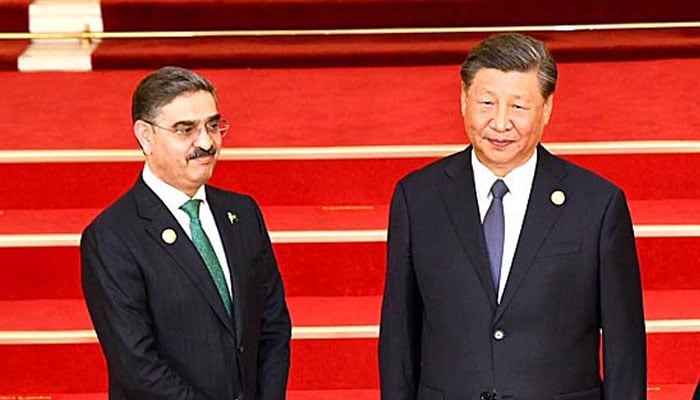RMB clearing bank by ICBC: will it benefit Pakistan?
Prime Minister of Pakistan’s recent visit to China was dubbed as fruitful due to multiple reasons. He started the visit by attending 3rd BRI Forum on the eve of 10th anniversary of BRI. The premier urged the global community to work together to combat contemporary challenges.
He also held bilateral meetings with top leadership of China. He met with President XI Jinping and discussed the issues of bilateral interests. He also met with Prime Minister of China and others. The leadership of both countries deliberated on the future of bilateral relations and the China-Pakistan Economic Corridor. They showed their satisfaction over successful execution of CPEC projects and admired the contribution of CPEC to Pakistan’s economic growth and development. They acknowledged the need to accelerate implementation of the second phase of CPEC and reap its full benefits.
Pakistan and China also signed numerous MOUs and agreements, including ML-1, accords on trade and commerce, food security & research, space cooperation, health, industrial cooperation and climate change.
Moreover, they decided to celebrate 10th anniversary of CPEC by giving a new impetus to implementing the second phase of CPEC. For that purpose, they agreed on multiple areas of cooperation. Financial cooperation was one of them. It was decided China and Pakistan would put all efforts into defining mechanisms for financial cooperation and strengthening the existing financial cooperation mechanisms.
In pursuance of these discussions and agreements, Chinese and Pakistani institutes have started implementing different programmes. Industry and Commercial Bank of China (ICBC) took the lead and launched a new initiative with the name of RMB Clearing Bank. People’s Bank of China has extended its full support to this initiative to make it a success. The bank has shown great confidence in the Pakistani market and ensured it will keep improving the financial cooperation between the two countries.
The RMB by Industry and Commercial Bank of China has been designed to expedite the process of development of mechanisms for financial cooperation. Bo Zhou, Chief Executive Officer of ICBC Pakistan, said the RMB clearing bank would help improve financial cooperation in multiple areas.
It will facilitate trade and investment between the two countries. It will be more convenient for the investors to use RMB and expedite implementation of projects. It will act as a catalyst for the CPEC and accelerate the implementation of the CPEC.
It is pertinent to mention here ICBC is already playing a prominent role in CPEC. It provided financial support for different CPEC projects. It is envisioned the launch of RMB will further strengthen the role of ICBC.
It will also focus on new areas. It was pointed out ICBC will enhance funding and loans for agriculture, livestock and other sectors. It will help bridge the investment gap in Pakistan, especially in the agriculture and livestock sectors.
ICBC will come up with new products to make it more dynamic. It will try to diversify the products and meet the market’s needs. It will also encourage fair competition in the financial market of Pakistan.
Establishing the RMB will benefit Pakistan on multiple fronts.
There would be no need for a correspondence bank for financial transactions between Pakistan and China. Before the launch of the RMB clearing bank, Pakistan had to rely on correspondent banks in Hong Kong or elsewhere. It was time-consuming and expensive, as the business community had to pay transaction fees.
Now, the RMB clearing bank will help reduce the transaction time. It will also eliminate the correspondent bank’s fees. It will be more convenient for the business community to do business without third-party involvement. The RMB clearing bank will facilitate liquidity of the bank in the local market. It is assumed enhanced liquidity will encourage development of new products and businesses in the local market. New products will strengthen the financial market of Pakistan. Pakistan is also expecting the limit for the money swap will increase. Money swap arrangements have already helped Pakistan meet the country’s urgent needs. The State Bank of Pakistan pointed out during the financial year of 2021-2022, Pakistan utilised 30 billion Yuan limit. It was a big relief for foreign reserves-starved country.
The availability of RMB will also lower pressure on the foreign reserves of Pakistan. RMB is emerging as new money for international transitions. Right now, it stands in the second position regarding using currency for international trade transactions. The use of RMB is increasing with every passing day, as many countries have opted for it. Saudi Arabia will use RMB for trade and economic linkages. The country is working with China to devise mechanisms for using Yuan for oil trade.
Iran has also joined the club. Brazil is promoting the use of RMB. Russia is leading the race and has signed multiple agreements of hundreds of billions of Yuan. Argentina has allowed citizens to operate RMB-based accounts.
On the other hand, RMB is gaining traction at global institutions. For example, its share in IMF’s SDR has reached 12.2 percent. Though quite low compared to the potential of RMB, but significant. If the IMF implements the reform agenda in its true spirit, the share of RMB will be much more.
People’s Bank of China also launched the Cross-Border Interbank Payments System (CIPS) in 2015 to facilitate international transactions further.
With more liquidity, enhanced money swap limit and investment, Pakistan will have more options to use RMB in trade and invite investment.
It will help Pakistan lower its dependence on the US dollar. It is much needed, as the West has weaponised its financial system and dollar. By using both, they compel countries accept their terms and conditions.
Pakistan can also mobilise financial resources for the projects other than CPEC. With the right set of policies and plans, it can also mobilise financial resources for SIFC programmes.
RMB also has a political dimension. It is the first clearing bank in South Asia. Although India is the biggest trading partner of China in the region (more than $125 billion in bilateral trade), ICBC selected Pakistan to open an RMB clearance bank. It shows China attaches high importance to Pakistan.
Experts say using RMB will save Pakistan from global political games. For example, Pakistan suffered immensely as it had to face wrath of FATF and other Western financial institutions after the launch of CPEC. FATF laterally suffocated investment in Pakistan by putting it on the grey list. It created a fear among the investors and potential trade partners.
Western financial institutions followed FATF’s instructions and made it difficult for businessmen to operate. It was easier for them to arm-twist Pakistan, the country solely depending on the Western financial institutions. It is believed by diversifying the foreign reserves and transaction systems, Pakistan would be better positioned to avoid blackmailing by FATF and the Western institutions.
In conclusion, it can be termed an excellent initiative by the Industrial and Commercial Bank of China. It will help business community from both sides of the border expedite economic cooperation, and will further strengthen bilateral relationship.
-
 Andrew Mountbatten-Windsor Was Mentioned In Epstein Email Sent Before His Death
Andrew Mountbatten-Windsor Was Mentioned In Epstein Email Sent Before His Death -
 'Dump Eugenie And Beatrice': Andrew's Daughters Face Backlash After His Arrest
'Dump Eugenie And Beatrice': Andrew's Daughters Face Backlash After His Arrest -
 Hilary Duff Finally Addresses Ashley Tisdale's 'toxic Mom Group' Essay
Hilary Duff Finally Addresses Ashley Tisdale's 'toxic Mom Group' Essay -
 Ryan Coogler Explains Why His Latest Project 'Sinners' Is So Close To His Heart
Ryan Coogler Explains Why His Latest Project 'Sinners' Is So Close To His Heart -
 Meghan Markle, Prince Harry's Longtime Friend Shares True Feelings Of Royal Couple On Andrew Arrest
Meghan Markle, Prince Harry's Longtime Friend Shares True Feelings Of Royal Couple On Andrew Arrest -
 Who Is Punch? Here’s Everything To Know About The Viral Sensation Winning Over Internet
Who Is Punch? Here’s Everything To Know About The Viral Sensation Winning Over Internet -
 Andrew's 'mental Health' Concerns Comment Sparks Outrage On Social Media
Andrew's 'mental Health' Concerns Comment Sparks Outrage On Social Media -
 Taye Diggs Encourages People For Early Cancer Detection After Losing Both His Parents
Taye Diggs Encourages People For Early Cancer Detection After Losing Both His Parents -
 Mia Goth Reacts To Ex-partner Shia LaBeouf's Mardi Gras Arrest
Mia Goth Reacts To Ex-partner Shia LaBeouf's Mardi Gras Arrest -
 Andrew's Cash Crisis Exposed Amid '£1m' Legal Bills
Andrew's Cash Crisis Exposed Amid '£1m' Legal Bills -
 Huge Donations Made On Eric Dane GoFundMe
Huge Donations Made On Eric Dane GoFundMe -
 Matty Healy Sets Summer Wedding Date Close To Ex Taylor Swift's Nuptials
Matty Healy Sets Summer Wedding Date Close To Ex Taylor Swift's Nuptials -
 Jennifer Lawrence On Her Complicated Relationship With Fame While Battling Rejection: 'Annoying'
Jennifer Lawrence On Her Complicated Relationship With Fame While Battling Rejection: 'Annoying' -
 Protest Held Outside Andrew Mountbatten-Windsor Home
Protest Held Outside Andrew Mountbatten-Windsor Home -
 NASA Targets March 6 For Launch Of Crewed Mission Around Moon Following Successful Rocket Fueling Test
NASA Targets March 6 For Launch Of Crewed Mission Around Moon Following Successful Rocket Fueling Test -
 Conan O'Brien Addresses Rob Reiner's Tragic Death After Explosive Clash At Christmas Bash
Conan O'Brien Addresses Rob Reiner's Tragic Death After Explosive Clash At Christmas Bash




